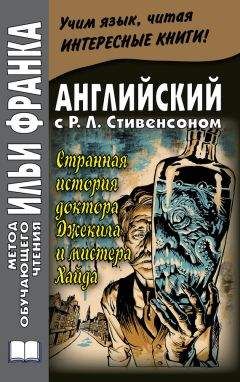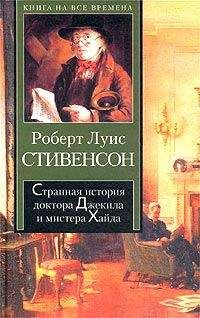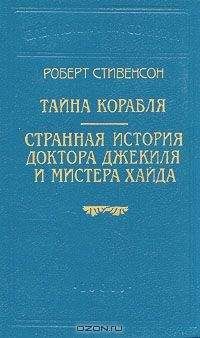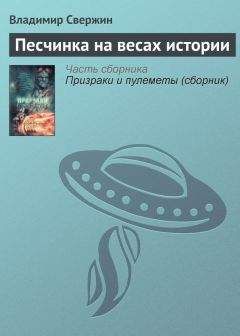Robert Stevenson - Английский язык с Р. Л. Стивенсоном. Странная история доктора Джекила и мистера Хайда
thoroughly ['TArqlI] surgeon ['sq:dZ(q)n] predecessor ['pri:dIsesq] cobweb ['kObweb] entrance ['entrqns]
All these they now thoroughly examined. Each closet needed but a glance, for all were empty, and all, by the dust that fell from their doors, had stood long unopened. The cellar indeed, was filled with crazy lumber, mostly dating from the times of the surgeon who was Jekyll's predecessor; but even as they opened the door, they were advertised of the uselessness of further search, by the fall of a perfect mat of cobweb which had for years sealed up the entrance. Nowhere was there any trace of Henry Jekyll dead or alive.
Poole stamped on the flags of the corridor (Пул топал /ногами/ по каменным плитам коридора; to stamp — ставитьштамп; топать/ногами/).
"He must be buried here (он, должно быть, похоронен здесь)," he said, hearkening to the sound (сказал он, прислушиваясь к звукам).
"Or he may have fled (а может быть, он бежал; to flee— убегать, спасаться бегством)," said Utterson, and he turned to examine the door in the by-street (и повернулся, чтобы осмотреть дверь, которая вела в переулок). It was locked (она была заперта); and lying near by on the flags, they found the key already stained with rust (и рядом с ней они обнаружили ключ, лежавший на каменных плитах, уже покрывшийся ржавчиной; to stain — пятнать, покрыватьпятнами).
"This does not look like use (не похоже, что им пользовались: «это не выглядит как использование»)," observed the lawyer (заметил нотариус).
"Use (пользовались)!" echoed Poole (эхом отозвался Пул). "Do you not see, sir, it is broken (сэр, разве вы не видите, что он сломан)? much as if a man had stamped on it (так, словно на него наступили)."
buried ['berId] hearken ['hQ:kqn] examine [Ig'zxmIn] stained [steInd] echo ['ekqu]
Poole stamped on the flags of the corridor. "He must be buried here," he said, hearkening to the sound.
"Or he may have fled," said Utterson, and he turned to examine the door in the by-street. It was locked; and lying near by on the flags, they found the key already stained with rust.
"This does not look like use," observed the lawyer.
"Use!" echoed Poole. "Do you not see, sir, it is broken? much as if a man had stamped on it."
"Ah," continued Utterson (продолжил Аттерсон), "and the fractures too, are rusty (и места разлома тоже покрыты ржавчиной; fracture — перелом; излом, поверхностьизлома)." The two men looked at each other with a scare (мужчины испуганно переглянулись; scare— внезапный испуг; паника).
"This is beyond me, Poole (Пул, это выше моего понимания; beyond— зд. указывает на выход за пределы, границы, рамки чего-либо: выше, сверх, вне)," said the lawyer. "Let us go back to the cabinet (давайте вернемся в кабинет)."
They mounted the stair in silence (они молча поднялись по лестнице), and still, with an occasional awestruck glance at the dead body (и вновь, /бросая/ иногда преисполненный страха /перед чем-то мистическим/ взгляд на мертвое тело; occasional — нерегулярный; awestruck — проникнутый, охваченный благоговением, благоговейным страхом; awe — страх, трепет, благоговение; to strike — ударять, поражать), proceeded more thoroughly to examine the contents of the cabinet (продолжили более тщательно осматривать содержимое кабинета = все, что находилось в кабинете). At one table, there were traces of chemical work (на одном столе остались следы химического опыта; work — работа, труд), various measured heaps of some white salt being laid on glass saucers (отмеренные кучки какой-то белой соли были разложены на стеклянных блюдцах; to measure — измерять, мерить; отмерять, отсчитывать), as though for an experiment (словно для какого-то опыта/эксперимента) in which the unhappy man had been prevented (который несчастному помешали /провести/; to prevent — предотвращать; мешать, препятствовать).
fracture ['frxktSq] scare [skeq] awe-struck ['O:strAk] various ['ve(q)rIqs] saucer ['sO:sq]
"Ah," continued Utterson, "and the fractures too, are rusty." The two men looked at each other with a scare. "This is beyond me, Poole," said the lawyer. "Let us go back to the cabinet."
They mounted the stair in silence, and still, with an occasional awestruck glance at the dead body, proceeded more thoroughly to examine the contents of the cabinet. At one table, there were traces of chemical work, various measured heaps of some white salt being laid on glass saucers, as though for an experiment in which the unhappy man had been prevented.
"That is the same drug that I was always bringing him (это то же самое лекарство, которое я ему всегда приносил)," said Poole; and even as he spoke, the kettle with a startling noise boiled over (и как раз когда он говорил, /вода/ в чайнике с пугающим/заставляющим вздрогнуть шумом убежала; to boil — кипятить; to boil over — убегатьчерезкрай/ожидкости/; to startle — испугать; поразить, сильно удивить; заставить вздрогнуть).
This brought them to the fireside (это привело = заставилоихподойти к камину), where the easy chair was drawn cosily up (к которому было /уютно/ пододвинуто мягкое = покойное кресло) and the tea things stood ready to the sitter's elbow (а чайная посуда стояла /наготове/ рядом с сидящим; elbow — локоть), the very sugar in the cup (и в чашке даже лежал сахар). There were several books on a shelf (на /каминной/ полке стояло несколько книг); one lay beside the tea things open (одна из них лежала открытой рядом с чайным прибором), and Utterson was amazed to find a copy of a pious work (и Аттерсон с удивлением обнаружил, что это был экземпляр одного религиозного труда; pious— набожный, благочестивый), for which Jekyll had several times expressed a great esteem (относительно которого Джекил несколько раз высказывал большое почтение), annotated, in his own hand, with startling blasphemies (снабженный написанными его собственным почерком пугающе богохульствующими комментариями; to blaspheme — поносить, оскорблять; богохульствовать; blasphemy — богохульство).
kettle [ketl] elbow ['elbqu] pious ['paIqs] esteem [I'sti:m] blaspheme [blxs'fi:m] blasphemy ['blxsfImI]
"That is the same drug that I was always bringing him," said Poole; and even as he spoke, the kettle with a startling noise boiled over.
This brought them to the fireside, where the easy chair was drawn cosily up and the tea things stood ready to the sitter's elbow, the very sugar in the cup. There were several books on a shelf; one lay beside the tea things open, and Utterson was amazed to find a copy of a pious work, for which Jekyll had several times expressed a great esteem, annotated, in his own hand, with startling blasphemies.
Next, in the course of their review of the chamber (затем, в ходе осмотра комнаты = продолжая осмотр) the searchers came to the cheval-glass (они: «проводящие осмотр» подошли к большому зеркалу в подвижной раме), into whose depths they looked with involuntary horror (в глубины которого они взглянули с невольным отвращением и страхом). But it was so turned as to show them nothing but the rosy glow playing on the roof (но оно было повернуто таким образом, что не показало им ничего, кроме розовых отблесков, играющие на потолке), the fire sparkling in a hundred repetitions along the glazed front of the presses (огня, сверкающего сотнями отражений в стеклянных фасадах шкафов; repetition — повторение), and their own pale and fearful countenances (и их собственных бледных и испуганных лиц), stooping to look in (наклонившихся, чтобы заглянуть /в зеркало/).
"This glass has seen some strange things, sir (это зеркало видело странные вещи, сэр)," whispered Poole (прошептал Пул).
review [rI'vju:] cheval glass [Sq'vxlglQ:s] involuntary [In'vOl(q)nt(q)rI] repetition ["repI'tIS(q)n] countenance ['kauntInqns]
Next, in the course of their review of the chamber the searchers came to the cheval-glass, into whose depths they looked with involuntary horror. But it was so turned as to show them nothing but the rosy glow playing on the roof, the fire sparkling in a hundred repetitions along the glazed front of the presses, and their own pale and fearful countenances, stooping to look in.
"This glass has seen some strange things, sir," whispered Poole.
"And surely none stranger than itself (и уж, конечно, не более странные, чем оно само)," echoed the lawyer, in the same tone (отозвался нотариус таким же тоном). "For what did Jekyll (для чего Джекил)" — he caught himself up at the word with a start (при этом слове он вздрогнул и умолк; to catch— поймать; прерывать, останавливать /резко, внезапно/; start — начало; вздрагивание, рывок) and then conquering the weakness (а затем, преодолевая собственную слабость /сказал/; to conquer — завоевывать; преодолевать): "what could Jekyll want with it (зачем оно понадобилось Джекилу)?" he said.




